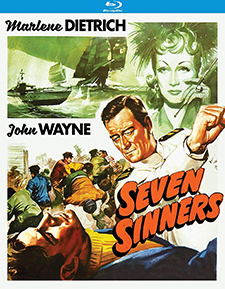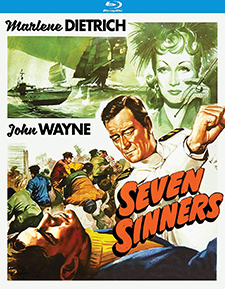Seven Sinners (Blu-ray Review)

Director
Tay GarnettRelease Date(s)
1940 (November 3, 2020)Studio(s)
Universal Pictures (Kino Lorber Studio Claisscs)- Film/Program Grade: B
- Video Grade: B+
- Audio Grade: B
- Extras Grade: A
Review
Intended to capitalize on John Wayne’s star-making performance as the Ringo Kid in Stagecoach, made the year before, Seven Sinners (known in the UK as Cafe of the Seven Sinners) became a star showcase for Marlene Dietrich. Following her memorable comeback in the western comedy Destry Rides Again, Dietrich plays her signature character, an entertainer of questionable background with a heart of gold that easily melts when the right guy comes along.
Bijou (Dietrich) is a honky-tonk singer who hops from one island to another in the South Pacific. Her sex appeal and glamour spark trouble and mass chaos wherever she goes. Men can’t resist her considerable charms and wind up in barroom brawls that cause extensive property damage. Regarded as a danger to the well-being of small island communities, Bijou’s resigned to being expelled time and time again and finding work wherever she lands.
Running out of islands, she sails to Bobi-Komba, site of an American naval base, accompanied by three n’er-do-wells: the ship’s drunken physician Dr. Martin (Albert Dekker), former sailor and Bijou’s self-appointed bodyguard Little Ned (Broderick Crawford), and magician/pickpocket Sacha (Mischa Auer). She gets a job at the Seven Sinners Cafe, where she becomes attracted to the good-looking Lt. Dan Brent (Wayne), who is more cultured and charming than the roughnecks she usually encounters.
Dan becomes intrigued by Bijou when he hears her sing, presents her with a bouquet of orchids, and invites her to perform aboard his ship at an upcoming party. Dan’s superior officers aren’t keen on his growing romantic interest in Bijou. They advise him that she has a reputation as a “naval destroyer” and the relationship could jeopardize his career. To complicate matters, a rival for Bijou’s affection, Antro (Oscar Homolka), becomes jealous, and his skill as a knife thrower puts Dan in danger.
Director Tay Garnett keeps the pace brisk. Actors and/or camera are in constant motion. The camera tracks Dietrich wherever she moves—slinking across the stage, meandering through the audience, making her way through a crowded dock, flouncing into a rickshaw. The film includes a number of well-staged fights. Unfortunately, a slugfest that opens the film takes place behind the title credits, so we don’t get the full flavor of the mayhem. Rudolph Mate’s cinematography is old-school Hollywood glamour and uses a soft key light on Marlene Dietrich’s face, where it draws the eye. He lingers on interesting Venetian blind shadows thrown by moonlight across the faces of Dietrich and Wayne in a romantic scene.
John Wayne is young and handsome. He’s a bit stiff but that suits the character of an ambitious naval officer, and his on-screen chemistry with Dietrich works. The role is far from the cowboys Wayne came to be known for, which makes it atypical and interesting. There’s no question, however, that Seven Sinners is Marlene Dietrich’s picture.
Dietrich knows how to deliver a comic line without overplaying and uses her facial expressions and body language to fill in what’s not in the dialogue. Vera West’s costumes for her are outlandishly flashy and expensive, especially for a saloon singer. Sequined gowns, lots of shimmering lame, elaborate hats, ostrich plumes, form-fitting dresses, and an officer’s uniform complete with tie and cap add visual pizzazz. Bijou stands out not only among the riff-raff with whom she associates but also at the fashionable shipboard party where she turns heads, both male and female. Dietrich sings three songs—I Can’t Give You Anything But Love, The Man’s in the Navy, and I’ve Been in Love Before—in her trademark husky, sensual voice.
There’s no serious conflict, and director Garnett plays the story mostly for laughs, with lots of incidental schtick from Crawford and Auer. The film’s naive charm and tropical romance is spiced up by Marlene Dietrich’s screen presence making Seven Sinners pleasantly amusing if not particularly memorable.
Featuring 1080p resolution, the Blu-ray release from Kino Lorber Studio Classics is presented in the aspect ratio of 1.37:1. Rudolph Mate’s black-and-white photography is notable for his use of soft light in Marlene Dietrich’s close-ups. He also favors interesting shadows and reflected light that give compositions complexity. Rickshaws provide local flavor. Dietrich emerges from a series of fluttering flags all with different patterns. In scenes with naval officers, white dominates, giving those scenes a kind of glow. Dietrich’s costumes are fashionably over the top and often very funny, especially the big, preposterous hats. Saloon scenes are shot with high-key lighting. On the ship, when Bijou and Dan are on deck, reflections of the water can be seen on the ship’s canvas railing. Fight scenes that bookend the film feature elaborate stunt work, with lots of actors, action, and movement. Production design is detailed and rich, with the dock areas filled with cargo, cars, and extras hurrying about.
The soundtrack is English Mono DTS-High Definition Master Audio. Optional English SDH subtitles are provided. Dialogue is clear and easily understood. Sound mixing combines dialogue and ambient sound nicely, and when Dietrich sings, the song dominates. She sings two numbers completely through and is interrupted in her rendition of a third. The Man’s in the Navy and I’ve Been in Love Before are by Frank Loesser and Jimmy McHugh. I Can’t Give You Anything But Love is by Jimmy McHugh and Dorothy Fields. The fight scenes contain sound effects of punches, furniture being smashed, bodies pummeled, and fists hitting jaws. The score, by Universal contract composers Frank Skinner and Hans J. Salter, is not especially distinctive and parts of it may have been used in other Universal productions.
Bonus materials include a new audio commentary and several theatrical trailers.
Audio Commentary – The commentary is shared by film historian David Del Valle and author/screenwriter C. Courtney Joyner. They compare Seven Sinners with Destry Rides Again, made the year before. A brawl behind the credits opens both films. Marlene Dietrich, who became a star in The Blue Angel, made seven films at Paramount with director Josef von Sternberg, who reinforced the glamour and mystery that made Dietrich the provocative star of the 1930s. The look of von Sternberg’s films was “meticulous artificiality.” Those films didn’t make money and she was labeled “box office poison.” Producer Joe Pasternak had a long history at Universal and felt he could present Dietrich in a vehicle that would endear her to the public. This was Destry Rides Again, which revitalized her career. She did Seven Sinners for $75,000, a big cut from her usual salary. An astute businesswoman, she knew times were changing and the films she had done with von Sternberg were old-fashioned. In the film, she’s earthy, makes jokes, is comically bawdy, and is adept at comic timing. Seven Sinners features great line readings, and audiences loved her. The other actors in the film were at the top of their game after appearing in films from the “amazing year of 1939.” Dietrich retired from the screen with dignity, never having made a horror film, as did Bette Davis and Joan Crawford. She had hoped to make movies in France but World War II prevented her return to Europe. Knowing that “reinventing yourself is the key to sustaining a career,” Dietrich turned to performing a one-woman show. “She was best in front of an audience.” Pre-World War II, Hollywood was fascinated with the exotic Orient and many pictures were set there. Seven Sinners contains homages to Dietrich’s previous films. Bijou enjoys her reputation and is not a character of despair. In her personal life, Dietrich was a sexually liberated woman and had many lovers. Gossipy tidbits about her liaisons are briefly discussed. On the set, she was friendly with her fellow cast members. The final scene contains lots of action and features the “deans of the Universal stunt department.” The commentary concludes with the two men noting that movie entertainment in the 1940s was first and foremost about making sure the audience got its money’s worth. Seven Sinners delivers a good story, comedy, and the luminous star power of Marlene Dietrich.
Theatrical Trailers – Five trailers are included: Seven Sinners, The Spoilers, Pittsburgh, The Flame of New Orleans, and The Shepherd of the Hills.
– Dennis Seuling

